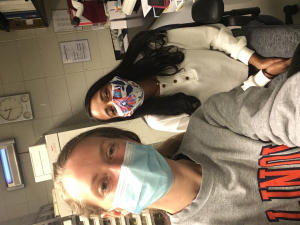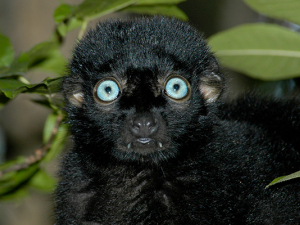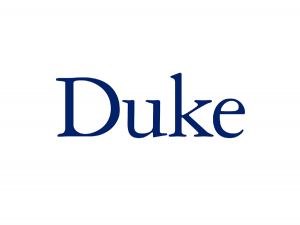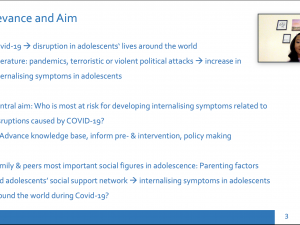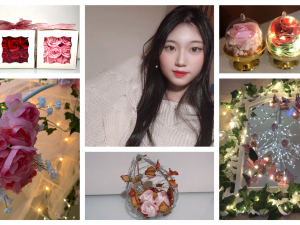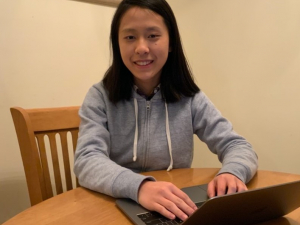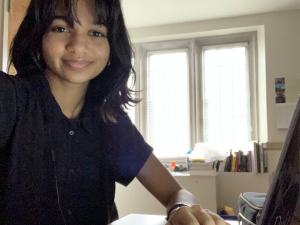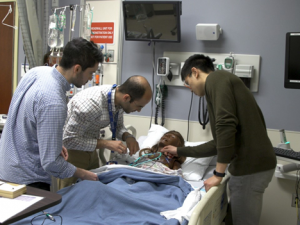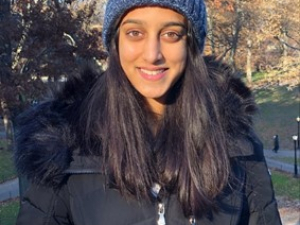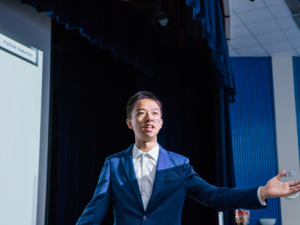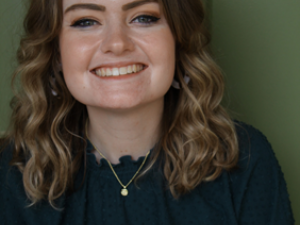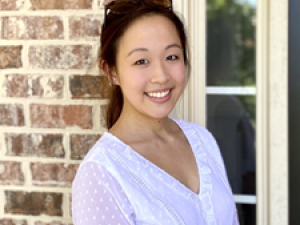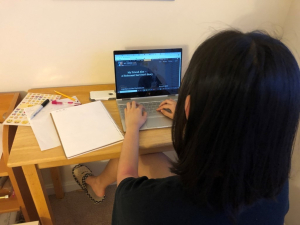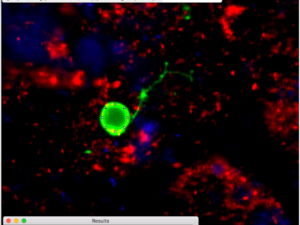For the past two and a half years, I have been studying zebrafish notochord segmentation in the Bagnat lab. After taking Biology 201 in the fall semester of my sophomore year, I became fascinated with molecular biology and genetic engineering technology. The Bagnat lab, which specializes in zebrafish spine and gut formation, caught my attention due to its groundbreaking research in notochord and spine segmentation and its applicability to humans. In particular, I was interested in engineering new genetic tools that would… read more about Generation of a Zebrafish Transgenic Line for Manipulating Notochord Patterning »
As part of Dr. Michael Kastan’s lab in the Department of Pharmacology and Cancer Biology, my project focused on elucidating the role of cohesin-associated proteins in DNA damage response functions. Cohesin is a ringlike structure that entraps DNA and helps maintain sister chromatid cohesion during cell division and regulates gene expression by facilitating three-dimensional chromatin structure. Cohesin is phosphorylated by ATM, an apical kinase that phosphorylates numerous proteins to instigate DNA repair pathways.… read more about Investigating ATM regulation of the cohesin complex in the DNA damage response »
My DSRF-funded project addressed seasonal changes in hormones in the female-dominant blue-eyed black lemur. According to what’s called the Challenge Hypothesis, male mammals are expected to show increased androgen concentrations during the intensely competitive breeding season and lowered concentrations during periods of child-care, because androgens facilitate increased aggression while inhibiting affiliative behavior. Given that female lemurs have also been shown to face mating competition, there is reason to think that… read more about Implications of seasonal hormone variation in the female-dominant blue-eyed black lemur »
In this research project, I was able to examine the role of a mesencephalic astrocyte derived neurotrophic factor (MANF) in protecting dopaminergic neurons from neurodegeneration in C. elegans. This degeneration is the primary cellular pathology underlying Parkinson’s Disease, a disease whose attributability to genetics alone is only possible in a small minority of cases. This has underscored the importance of elucidating how environmental interactions with biological systems can impact key pathways related to… read more about Impact of altering C. elegans MANF protein expression on dopaminergic neurodegeneration »
Winter 2020 Remote Research Over this winter break my graduate mentor and I met weekly to refine our survey based experimental project. In the pursuit of this goal, we have refined our hypothesis given the data from experiment one and are looking forward to implementing the second phase of the experiment, made possible in part by this grant. We completed our statistical analysis of experiment one showing initial report for what we call the Equal Mind hypothesis. Essentially, we hypothesize that when individuals merely… read more about Equal Mind hypothesis »
Winter 2020 Remote Research In order to graduate with distinction, I am hosting a virtual zero waste fashion show titled “How Fashion is Failing You.” My program II: Intersectional Sustainability in Fashion has exposed me to the various ways the fashion industry fails humans and the environment. This show will highlight these failures and explore various ways fashion can be more intersectionally sustainable. Pictured, I am sewing a distressed jacket. This is just one of the upcycled pieces that will be featured in the show. read more about How Fashion is Failing You »
Winter 2020 Remote Research During this past winter, I had the pleasure of working on a cross-national research team looking at novel COVID research. This research is utilizing a risk and resilience framework to investigate how disruptions due to the pandemic relate to changes in internalizing in adolescents and young adults. Currently we have officially launched in Germany, one of our two sites, and are currently awaiting participant responses! I am very excited to see what the findings will be and hopefully we will be… read more about COVID-19 and Adolescence »
Winter 2020 Remote Research As an initial engagement to my Senior Capstone Project, I am preparing to hold an autobiographical art exhibition to encourage the audience to reflect on self and society as they engage with the artworks that draw metaphors between individuals and flowers. By incorporating the theme of flowers throughout the exhibition based on a timeline of life, I hope to convey the central message “Bloom to your potential.” Over the winter break, I created artworks based on floriography and garden… read more about Bloom to Your Potential »
Winter 2020 Remote Research The G protein-coupled receptor (GPCR) family is a main target of therapeutics and has many important physiological functions. During this past winter break, I worked with Dr. Seungkirl Ahn to better understand the experimental questions surrounding allosteric modulators as potential therapeutics for the beta2-adrenergic receptor, a type of GPCR. The literature review focused on the exciting discoveries of a positive allosteric modulator and a negative allosteric modulator for the… read more about GPCR family Research »
Winter 2020 Remote Research At the intersection of sexual and gender minority (SGM) research and medical anthropology lies a body of literature that examines culturally informed experiences of health, medicine, and illness as it relates to queer people, what we will refer to as queer medical anthropology. These texts include publications that elevate SGM voices on topics medical professionals need to understand to provide equitable care, including SGM specific barriers to accessing healthcare services, culturally informed… read more about Queer Medical Anthropology »
Summer 2020 Remote Research With the outbreak and continued spread of COVID- 19, lockdowns, layoffs, and public measures to contain the virus have significantly impacted day-to-day life. For parents and caregivers, they may be navigating remote work or facing job loss and unemployment stress. For children out of school or childcare, they may be without structured access to educational activities or opportunities for social interaction. For populations that are socially vulnerable, these effects may be heightened (… read more about Impacts of COVID on the Southern United States »
Summer 2020 Remote Research With the unanimous and enthusiastic support of more than 70 registered nurses (RN) in the intensive care units (ICU) of Duke University Health System who were interviewed to validate the clinical need, our NatIV Technologies team is currently in the process of developing and marketing a product that will allow for easy, fast, and safe identification and tracing of IV tubing. I am working with this team to develop a device that will add clinical and economic value to the… read more about Developing a New Way to Trace IVs »
Summer 2020 Remote Research Do all of those drug ads on TV affect public knowledge and knowledge structures for key information, such as side effects? Drug ads provide some of this information directly to the public. However, the complete list of side effects as well as their frequency and severity are not fully provided, and they are presented in ways that make it hard to understand and remember them. Also, direct-to-consumer (DTC) ads are pervasive in the US but banned in the UK. Do knowledge structures for side effects… read more about Direct-to-Consumer Drug Advertising and Side Effects »
Summer 2020 Remote Research Throughout the summer I have been working with the Eating Disorder Lab to write out and submit our IRB application for our Gastrointestinal Symptoms and Dieting research study. I am absolutely delighted to inform you that we received approval from the IRB today! While we were waiting for approval, I completed the Qualtrics studies we are going to be administering, under the guidance of my supervisor and PI, Dr. Zucker. Each of the two surveys contain a lot of back-end coding of auto-… read more about Gastrointestinal Symptoms and Dieting »
Summer 2020 Remote Research This summer, I began developing an experiment with Dr. Day to explore the effects of explicit vs. implicit language in prescription drug ads on consumer understanding of side effects. I had previously collected data on the number of explicit and implicit side effects in recent ads as well as adverse events described on screen. This data was used to determine which ads to include in the experiment. Study participants will see ads that used either primarily explicit language, primarily… read more about Explicit vs Implicit Language and Drug Ads »
Summer 2020 Remote Research These past few months, I worked closely with my mentors, Dr. Nagy and Dr. Smoski, to create a research question that encompasses my love and appreciation for the study of social determinants of health, psychology, and the Latinx immigrant community. This fall, I will be investigating my research question: Are mental health outcomes mitigated by active coping practices and a strong belief in the American Dream in the face of adversity among young Latinx Immigrants in North Carolina? My… read more about The American Dream and Mental Health among Latinx immigrants »
Summer 2020 Remote Research I want to thank the URS Office for supporting me with a summer research on Abelian Surfaces. This research was co-advised by Dr Adam Gyenge from Mathematical Institute, Oxford University, and Dr Ezra Miller from Departments of Mathematics and Statistical Sciences, Duke University. Abelian Surfaces have rich structures and lie in the intersection of different directions of investigation. They can be understood from the complex-analytic point of view as tori. They can be understood as symplectic… read more about Group Actions on complex Abelian Surfaces »
Summer 2020 Remote Research This summer I had the pleasure of working under Dr. Kathleen Pryer where I was able to intersect machine learning and plants. I spent my time annotating images of herbarium specimens and discerning between different types of insect damage. I primarily looked out for margin feeding, hole feeding, and skeletonization. I utilized an online website named V7 Labs to compile all of my work. It was a true pleasure working in a community of other students interested in herbaria and plants. Thank you,… read more about Machine Learning and Plant Insect Damage »
Summer 2020 Remote Research This past summer, I worked remotely in the Cell Death Laboratory under Dr. Gayathri Devi, contributing to a review manuscript on inflammatory breast cancer (IBC) with an emphasis on its key characteristic apoptotic dysregulation. Due to my interests in the interactions of the immune system and cancer, I compiled and summarized literature from key research groups and papers involved in the tumor microenvironment of IBC and incorporated this information into writing the section on how IBC avoids… read more about Apoptotic Signaling and Tumor Microenvironment in Inflammatory Breast Cancer »
Summer 2020 Remote Research My project seeks to examine the genre of the Gospel of Luke through consideration of other ancient biographies and historical writings. Answering the question of genre and sub-genre can lead to a more complete understanding of the text in question. In my project, I will argue that any genre-based discussion of the Gospel of Luke must serve due respect to Luke’s careful treatment of Hebrew Bible scriptures and prophecies. Further, one must consider Luke’s ascription of authority to Hebrew Bible… read more about Caleb Cooke - The Genre of the Gospel of Luke »
Summer 2020 Remote Research Thinking about multiple identities (e.g., social identities, gender, race, family identities, group identities, etc.) boosts creativity and cognitive flexibility in both monoracial and multiracial individuals. However, the mechanism of this multiple identity mindset and whether its influence extends to social interactions remains unknown. In light of these gaps, I designed an online study to investigate if a multiple identity mindset differentially affects cognitive depletion, creativity, and… read more about Multiracial Identity Effect on Cognitive Processes »
Summer 2020 Remote Research This summer, I was given the opportunity to continue my research with Dictionary of Art Historians, an online database for art historians. My research focuses on women from the nineteenth and twentieth century, a time when women were not granted equal academic standing as their male counterparts. During this summer, I was able to produce an additional 6 entries to help catalog the incredible women who made art history what it is today. read more about Cataloging Women Artists in the Dictionary of Art Historians »
Summer 2020 Remote Research Contemporary theory on the role of oxytocin and vasopressin in mammalian social bonds has been shaped by seminal vole research that revealed interspecific variation in neuroendocrine circuitry by mating system. The Eulemur genus of strepsirrhine primates contains socially monogamous (MO) and non-monogamous (NM) species, making it the sole primate analog to Microtus, and offering a rare opportunity for comparative nonapeptide research with greater evolutionary relevance to… read more about Oxytocin and vasopressin 1a receptor neuroanatomy in monogamous and non-monogamous Eulemur species »
Summer 2020 Remote Research Unlike other members of the family Lemuridae, the activity pattern of ruffed lemurs (Varecia) is not well established. Contradictions in the literature support either diurnality (active almost exclusively at day) or cathemerality (active at varying times across the 24-hour cycle), like the rest of their family members. I found some promising preliminary results in the wild that indicate cathemerality, and tie their nocturnal activity to lunar phases and… read more about Examining Effects on Nocturnal Activity of Black‐and‐white Ruffed Lemurs »
Summer 2020 Remote Research Alexander G. Weheliye calls racial stories the “hieroglyphics of the flesh” (2014, 43). Human flesh, yes, but not exclusively human -nonhuman animals can and do operate in stories about race as symbols, specters, and avatars. This essay explores the racial hieroglyphics of white dogs in three contemporary films: Steve McQueen’s Widows(2018), Wes Anderson’s Isle of Dogs(2018), and Bong Joon Ho’s Parasite (2019). Against the backdrop of Samuel Fuller’s White Dog (1982), the essay argues that white… read more about The Law is a White Dog: Examining Cultural Representations of Racial Oppression in the Legal System »
Summer 2020 Remote Research The goal of my study is to examine the relationship between different beliefs or “mindsets” about stress (e.g., stress-is-enhancing; stress-is-debilitating) and the everyday language that people use to talk about their stress. Previous research has concluded that people who are “low in evaluation anxiety” have an easier time completing tasks and gain a heightened understanding of the material (Anderson et al., 2008). We want to use this preliminary research to better understand how college… read more about Stress Mindset and Language »
Summer 2020 Remote Research During the semester, I was part of Dr. Agris’s Lab and worked on a project focused on studying the role of the Cdkal1 gene, which encodes a tRNA-methylthiotransferase enzyme. In pancreatic β-cells, this enzyme catalyzes the addition of a methylthio group on adenosine-37 of tRNALys3 and without this modification, tRNALys3 becomes inefficient during translation and the frequency of mutations increases, which may be preventing mature insulin from forming correctly. Over… read more about Effect of CDKAL1 polymorphisms on insulin translation and susceptibility to developing Type 2 Diabetes »
Summer 2020 Remote Research Over the summer I worked with Dr. Gillian Sanders Schmidler on our perspective comparison project. This project started building on the work of previous summer interns at the Margolis Center who had evaluated the current use of multiple perspectives. Our current work used three different decision models and rebuilt them from four different perspectives. We aim to evaluate how changing the perspective of a cost effectiveness analysis will change the outputs. Last summer and over the school year… read more about Decision Modeling in Hearing Loss »
Summer 2020 Remote Research In my summer project, I worked with Steve Goldberg and two other Duke students to chronicle the life of Holocaust survivor Abe Piasek in a project titled My Friend Abe. The goal was to ensure that his life and the horrors of the Holocaust would not be forgotten nor repeated. Our work consisted of listening to interviews and talks that Abe gave, surveying historical records, reading articles about him, and polishing a presentation for a lecture series. The final deliverable was a beta… read more about Documenting the Life of Abe Piasek, Holocaust Survivor »
Summer 2020 Remote Research This summer, I worked remotely on a project in the Derbyshire lab investigating the role of host aquaporin-3 (AQP3) in the asymptomatic liver stage of malaria. I compiled hundreds of microscopy images of liver stage Plasmodium vivax parasites that are responsible for a significant portion of malaria cases (images taken by graduate student Kayla Sylvester). I used the Fiji software to measure the size of each parasite to classify them as either small form dormant… read more about The Role and Regulation of Host Aquaporin‐3 in Liver Stage Malaria »
